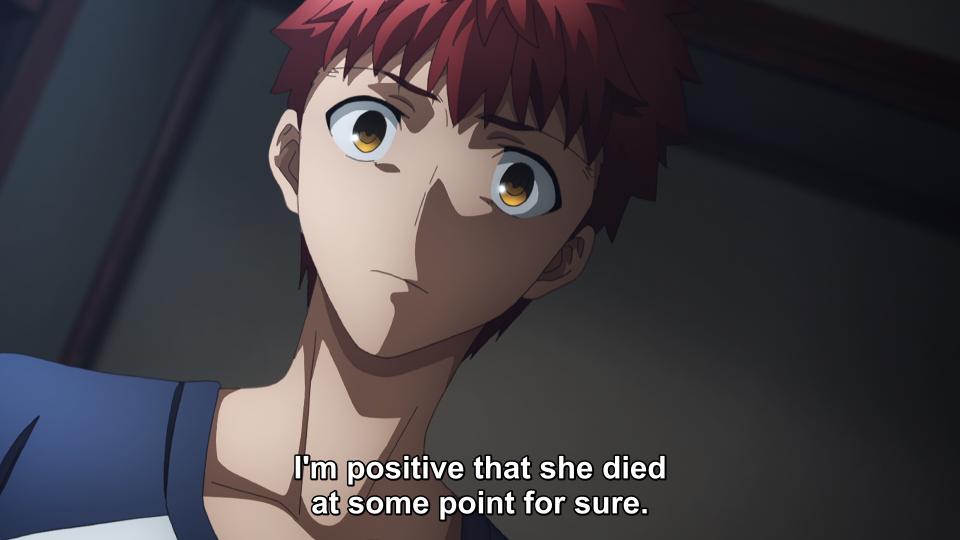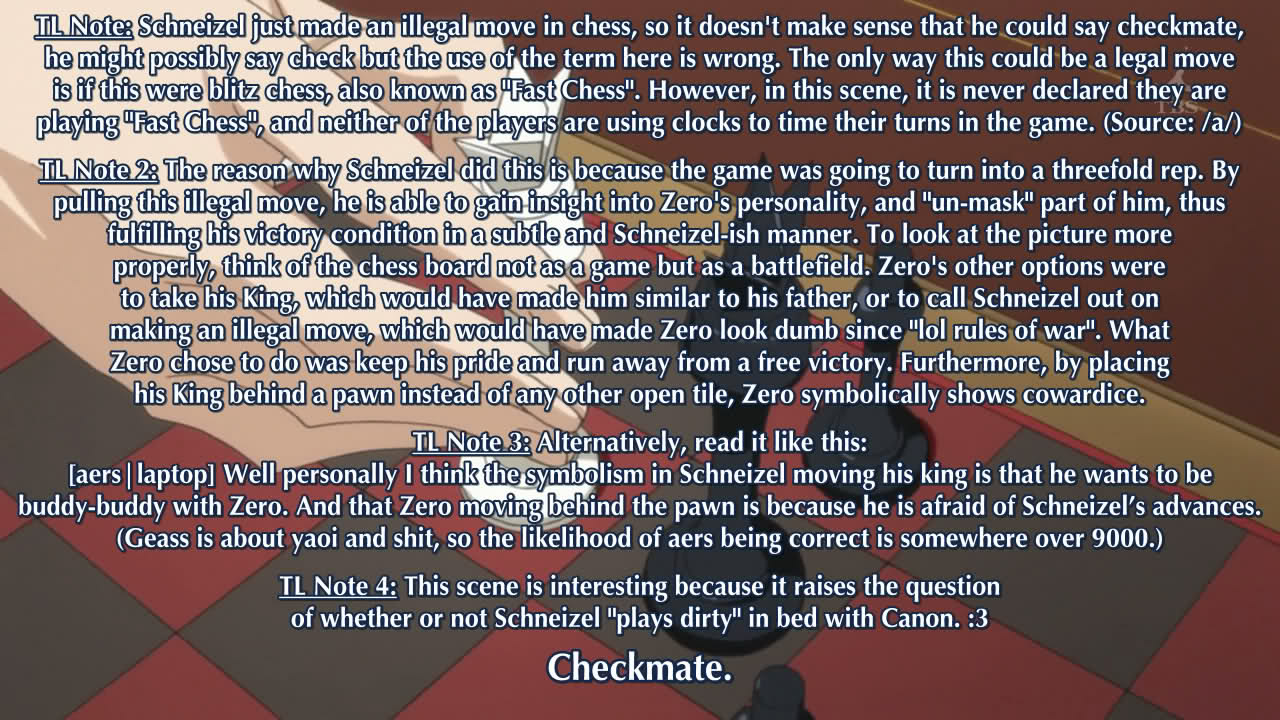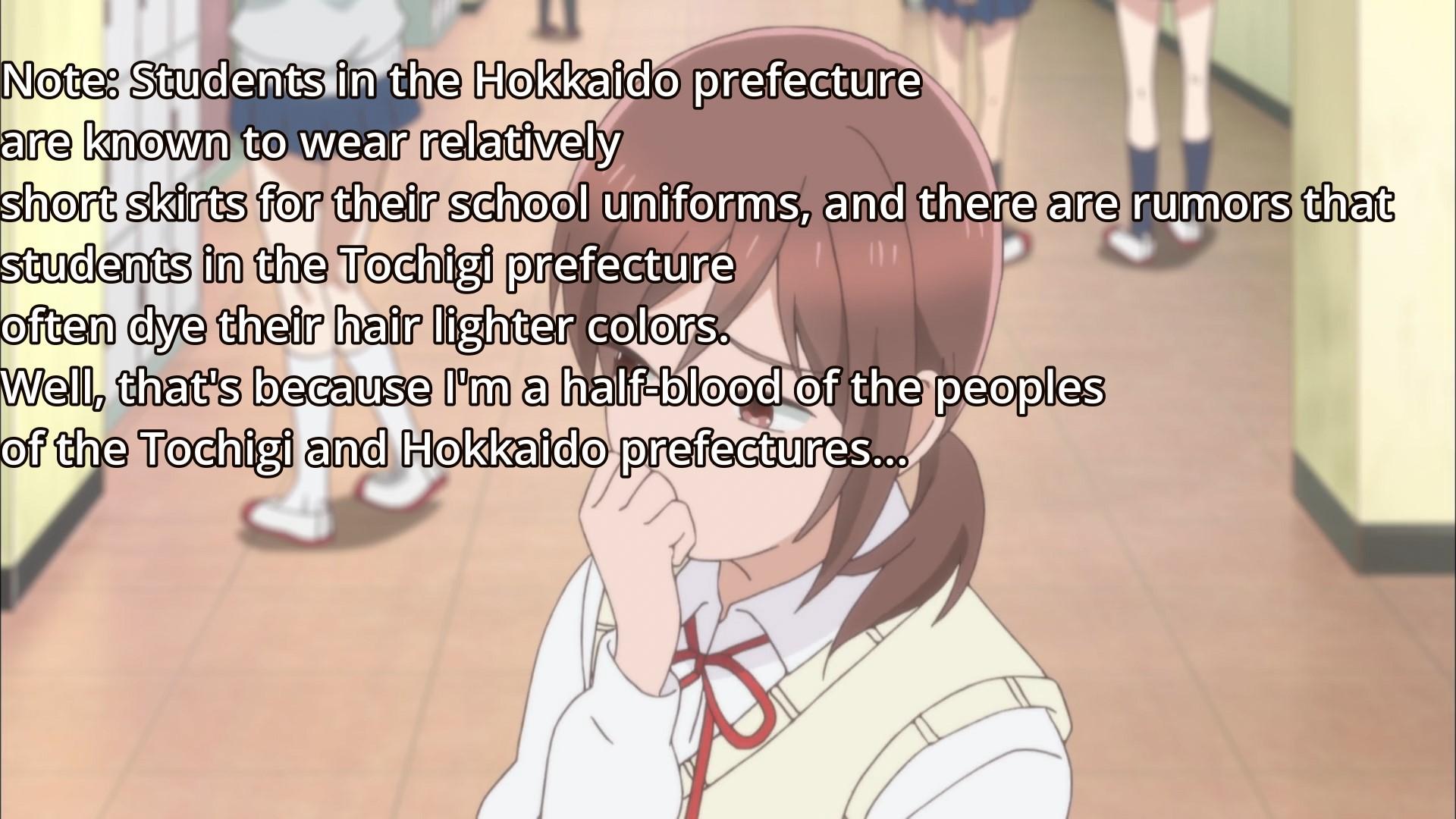Over the past couple of years, I’ve come to notice more and more fansubbers are working on projects without a translator on the team. Instead, they work off an official script from Crunchyroll or the like. It’s no new practice by any stretch of the definition, but it’s definitely become a lot more common.
It’s also a topic that happened to come up in conversation a fair few times this past week, so I figured I might share my thoughts on the matter. As you may have guessed from the title of this blog post, I’m not particularly fond of the practice, though not for any moral or ethical reason. I have a few other causes for concern.

Professional translators and fansubbers have (for the most part) grown in very different environments, and prioritise different things. The professional industry tends to value “correctness”, for lack of a better word, above all else. As such, professional translations are often very literal and robotic, focusing on dictionary-correct, word-to-word mapping. This seems appropriate on the surface, but language isn’t that simple. This approach can often result in awkward or meaningless lines when the author’s intent is implicit, ambiguous or nuanced.
In contrast, fan translators are not limited by corporate restrictions and tend to treat the work as more of a form of art than an input/output operation. They will usually write in more natural English; the kind of language you would typically see a character of that nature using. They might take liberties at times to convey humour or concepts that don’t exist in English or western culture, to help preserve the writer’s intentions rather than the exact words that were spoken. There’s another argument to be had here, but it’s not for this post.

Anyway, the disparity is quite noticeable when put side-by-side, so you get a rather interesting product when you put the two together. Normally you’d have a TLC go over the CR script to check for mistakes and whatnot, and then it’s business as usual, right? However, I think there’s a bit of a difference between TLCing a fansubber’s script and TLCing a pro’s script.
Now I’m aware that professional translators are people too, but the scripts you see are again usually quite “robotic”. Think machine translation. When the TLC does a pass on this script, the difference in styles (as vague and anecdotal as this may sound) often results in a lower quality script than what you’d have if the TLC worked off an OTL.
This is irrespective of the perceived “quality” of the pro script, because the translating style is so fundamentally different. So, even if you have an allegedly good pro script, it will still be different to a good fan script, and that means the result will also be different.

I’ve been working on a project as TLC with another TL, and he’s recently switched from OTL to TLCing CR. I’ve been doing TLC passes of his CR TLCs instead of his OTLs, and they’ve all been, without fail, of much lower quality than his OTL scripts. I’m not trying to throw any shade at him, because his OTL scripts are great. But it’s the same guy working on them, so why are the OTL scripts and TLC scripts this different?
I can think of a few reasons. If he were to come up with the lines from scratch, he would write them in his own writing style. However, if he’s working with a CR script, then he’s got a base that he’s “stuck” with. Those lines won’t necessarily be written in the same flavour, and won’t be entirely rewritten to get to that point. They’ll typically only be tweaked around their current form. This will lead to a line that’s likely better than the original CR line, but different to (and not necessarily as good as) the line that would have been created had he come up with it from scratch.

It may seem obvious, but the base TL is what influences the final script the most. If I were a bit smarter, I’d try to come up with an analogy about soup broth or something, but I think you get the picture. Starting off with something subpar forces you to compensate, when it would be preferable to just start off with something good in the first place. Again I want to point out that this holds true even in the case of a “good” CR script, because “good” almost always means “better than CR’s usual”, not “as good as an OTL”.
TLCing CR begets complacency as well. Or laziness, if you want to put that connotation on it. This is actually more of an issue if you have a better CR script. It’s very easy to read a line, just brush it off as “good enough” and move on if you already have a script in front of you. If you have to think about the line with nothing to work with, chances are you’ll be putting a lot more thought into how each and every line should and will be written. Needless to say, you will end up with a better product overall.

Another issue with TLCing CR is the fact that the TLC can’t talk to the TL. The TLC doesn’t just check for mistakes, as the position title would imply. They also hang around to bounce ideas off and cover for lines the TL is unsure about, because let’s face it, TLs are far from perfect.
This is an important interaction that’s being entirely removed from the process. On top of affecting the quality of the release, there won’t be anyone around to help when the TLC gets stuck either. Let’s not even get started on subbing without a TL or a TLC.
all memes are correct translations.
— VX skiddiks XV (@heavenrend) May 24, 2019
All that being said, I’m not trying to start a revolt to make everyone OTL. Of course, doing an OTL is a lot more fun (and we’re doing this for fun, aren’t we?), but the time commitment can be daunting. CR TLCs have their place depending on your effort and care factors, but you don’t have to settle. What kind of Blankaex blog would this be if I didn’t give unwarranted and unsolicited advice despite having no authority on the matter?
Think of the TLC’s role not as “a spellcheck but for translations”, but rather “an editor that speaks Japanese”. Be liberal with your changes. By this, I don’t mean you should avoid literal translations. Instead, don’t be afraid to make changes. Make as many as you feel you need to, no matter how minor, and then make a few more. Most importantly, be constantly asking yourself “is this how this character would say this line if they spoke English?” In fact, have some examples of common CR issues from an Accelerator script by GJM.
Awkward repetition:
< Dialogue: 0,0:03:40.57,0:03:42.57,GJM_Main,,0,0,0,,Yeah, all right, all right.
---
> Dialogue: 0,0:03:40.57,0:03:42.57,GJM_Main,,0,0,0,,Yeah, whatever.
< Dialogue: 0,0:20:43.05,0:20:44.97,GJM_Main,,0,0,0,,I'm kidding, I'm kidding! Have a look, have a look!
---
> Dialogue: 0,0:20:43.05,0:20:44.97,GJM_Main,,0,0,0,,I'm kidding, have a look!
Incorrect inferral:
< Dialogue: 0,0:09:53.44,0:09:56.63,GJM_Main,,0,0,0,,Come on, where's Accelerator?
---
> Dialogue: 0,0:09:53.44,0:09:56.63,GJM_Main,,0,0,0,,Come on, Accelerator, where are you?
Japanese grammar structure:
< Dialogue: 0,0:09:40.72,0:09:46.14,GJM_Main,,0,0,0,,Damn, being that bulletproof and with a blade that sharp, what do we do?
---
> Dialogue: 0,0:09:40.72,0:09:46.14,GJM_Main,,0,0,0,,What can we even do against someone that's bulletproof {\i1}and{\i0} has a blade that sharp?
Japanese wording:
< Dialogue: 0,0:03:20.88,0:03:23.47,GJM_Main,,0,0,0,,This isn't a holiday or anything like one.
---
> Dialogue: 0,0:03:20.88,0:03:23.47,GJM_Main,,0,0,0,,That doesn't make it a holiday or anything.
Of course, all of my thoughts and advice come with the usual caveats. I’m only speaking from my experience, I don’t speak for everyone, there are fansubbers that have gone pro, there can be actually good prosubs, I only wrote about Japanese to English translations, I’m retarded and suck at translating and need to shut up. Oh, let’s not forget the sweeping generalisations about pro vs fan TLs as well. But if you made it to this point then you knew all of that already.